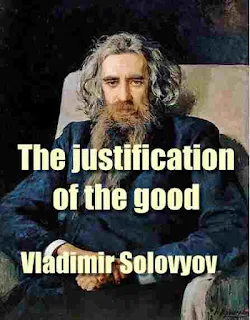The justification of the good
Excerpt from the preface:
t may be of use to the reader approaching Solovyof for the first time if I state in an elementary form the ideas to which the Russian philosopher specially consecrated his life and energies. They were: The universal Church, the idea of the unity of Christendom, and beyond that ultimately the conscious unity of mankind. Not a world republic, however, but a world church.
The evolution of the God-man, not the superman with his greater earth-sense and fierceness, but the God-man with his greater heaven-sense, mystical sense. The Eternal Feminine, a characterisation of all humanity at one in the mystical body of the Church.
The woman is the final expression of the material world in its inward passivity. Love as the highest revelation, the gleam of another world upon our ordinary existence. Love, therefore, is the proof of immortality, the guerdon and sense of it. Sancta Sophia, the Heavenly Wisdom, the grand final unity of praise, the wall of the city of God.
The Justification of the Good is the book in which Solovyof elucidates the laws of higher idealism. It is a classical work of the utmost importance in Russian studies.
All that is positive in modern Russian thought springs from the teaching of Solovyof. Time is only now coming abreast of him and he appears especially as the prophet of this era, with his vision of united humanity and the realisation of the kingdom. All students of thought and religion, both here and in America, ought to feel indebted to Mrs Duddington for the brilliant translation she has done. Tolstoy we know; Dostoievsky we know; and now comes a new force into our life, Solovyof, the greatest of the three. Through Solovyof we shall see Russia better and Europe better
The object of this book is to show the good as truth and righteousness, that is, as the only right and consistent way of life in all things and to the end, for all who decide to follow it. I mean the Good as such; it alone justifies itself and justifies our confidence in it. And it is not for nothing that before the open grave, when all else has obviously failed, we call to this essential Good and say, "Blessed art Thou, O Lord, for Thou hast taught us Thy justification." In the individual, national, and historical life of humanity, the Good justifies itself by its own good and right ways.
A moral philosophy, true to the Good, having discovered these ways in the past, indicates them to the present for the future. When, in setting out on a journey, you take up a guidebook, you seek in it nothing but true, complete, and clear directions with regard to the route chosen.
This book will not persuade you to go to Italy or Switzerland if you have decided to go to Siberia, nor will it provide you with money to traverse the oceans if you can only pay the fare down to the Black Sea.
Moral philosophy is no more than a systematic guide to the right way of life's journey for men and nations; the author is only responsible for his directions being correct, complete, and coherent. But no exposition of the moral norms — of the conditions, i.e. for attaining the true purpose of life — can have any meaning for the man who consciously puts before him an utterly different aim.
To indicate the necessary stations on the road to the better, when the worse has been definitely chosen, is not merely a useless but an annoying and even insulting thing to do, for it brings the bad choice back to one's mind, especially when in our inmost heart the choice is unconsciously and in spite of ourselves felt to be both bad and irrevocable.
I have not the slightest intention of preaching virtue and denouncing vice; I consider this to be both an idle and immoral occupation for a simple mortal since it presupposes an unjust and proud claim to be better than other people.
What matters, from the point of view of moral philosophy, are not the particular deviations from the right way, however great they may be, but only the general, definite, and decisive choice between two moral paths, a choice made with full deliberation.
The question may be asked whether every man makes such a choice. It certainly is not made by people who die in their infancy, and, so far as clear consciousness of self is concerned, many grown-up people are not far removed from babes. Moreover, it should be noted that even when conscious choice has been made, it cannot be observed from outside.
The distinction of principle between the two paths has no empirical definiteness, and cannot be practically defined. I have seen many strange and wondrous things, but two objects have I never come across in nature: a man who has finally attained perfect righteousness and a man who has finally become utterly evil. And all the pseudo-mystical cant based upon external and practically applicable divisions of humanity into the sheep and the goats, the regenerate and the unregenerate, the saved and the damned, simply reminds me of the frank words of the miller —
Long have I travelled
And much have I seen,
But copper spurs on water pails
Saw I have never seen.
Download 11.6 MB


